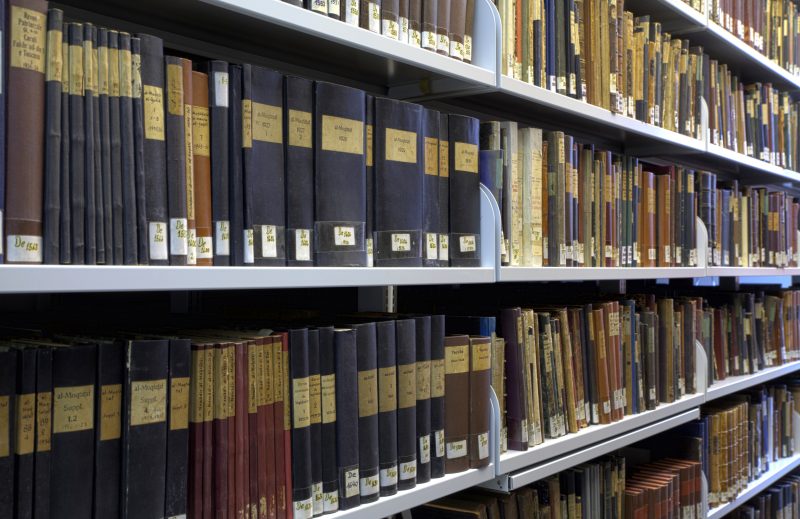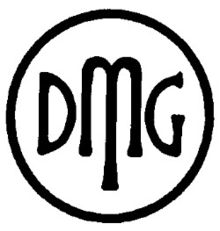Startpage » Usage + Visit » Subject Specific Services » Subject Information » The Library of the German Orientalist Society
Overview
Contact
This link leads to a list of all the subjects this person oversees.
Here you find the contact information of the above-mentioned person.
Library Holdings and Acquisitions
The library of the German Orientalist Society contains extensive literature regarding Semitic studies, Arabic studies, Iranian studies, Turkology and Indology, primarily in linguistic regard, but also relating to other scientific areas such as history, ethnology, literature, cultural studies and art studies. Furthermore, books on Australian and various African languages as well as on Sino-Tibetan (Chinese) and Tibetan-Burmese (Burmese, Tibetan) languages, on Japanese and on indigenous American languages were collected.
Indexed in the old classification for Theology, for example, it is possible to find an extensive collection of translations of the Bible and indexed in the old classification for Arabic a collection of editions, translations and commentaries on the Koran are listed.
Today, the holdings include over 69,000 volumes, whilst further encompassing a historical book collection (up to 1845) of about 21,100 titles. Among these holdings are valuable works such as one of the first Latin translation of the Qur’an (1543), the first Qur’an translated into German (1772) and the oldest European representation of Arabic grammar (1505) as well as a cradle print from 1498 (a translation of Avicenna’s medical textbook).
The current acquisition focus for the library of the DMG lies on the subjects of Arabic studies and Islamic studies concentrating on the of the Middle East and North Africa. Other areas of Oriental Studies may be considered in literature acquisitions user request. Acquisition proposals can be submitted here.
Finding and Using
The holdings of the DMG library is located in stacks at the Branch Library Middle East/Ethnology and therefore have to be ordered via Ha:lit. The lending of requested media is taking place at the circulation desk of the Branch Library Steintor-Campus. Literature published more than 100 years ago are only accessible for use in the reading room; otherwise, the holdings can be borrowed freely.
Additionally, there is an area containing general reference works and dictionaries as well as manuscript catalogues shelved in the reading room of the Branch Library Middle East / Ethnology.
Older holdings not yet indexed in the online catalogue of the ULB can sometimes be researched by using the Image Catalogues of the ULB or have to be researched by using the card catalogue on site at the Branch Library Middle East/Ethnology.
Via the website of the Specialised Information Service Middle East, North Africa and Islamic Studies MENALIB, maintained by the ULB, digitised titles from the holdings of the DMG library can also be found. Additionally, the Virtual Subject Library MENAdoc contains the printed card catalogues on the holdings of the DMG library.
The use of manuscripts, scientific estates and other special collections is only possible per written request well in advance. Requests for use should be addressed to the contact.
Scientific Estates of the DMG
The estates of the names marked with an * are indexed in the Pohlus directory. The PDF files are currently only available in German.
A-K
- BERGGREN, Jacob (1790-1868), Pastor
- BRACKE, Otto (1872-1934), Lawyer
- BROCKELMANN, Carl (1868-1956), Orientalist
- BUITENEN, Johannes Adrianus Bernardus van (1928-1979), Indologist
- BURKHARD, Karl Friedrich (1824-1893), Philologist
- CAPPELLER *, Carl (1840-1925), Indologist
- FISCHER, August (1865-1949), Orientalist
- FLEISCHER, Heinrich Leberecht (1801-1888), Orientalist
- FÜCK, Johann Wolfgang (1894-1974), Orientalist
- GADOW, Johann Heinrich (1815-1895), Theologian, Pastor
- GILDEMEISTER*, Johannes (1812-1890), Indologist
- GOBINEAU, Joseph Arthur Graf von (1816-1882), Diplomat
- GOTTWALDT, Joseph (1813-1897), Head Librarian
- GOUTTA, Guido Edler von (1887-1966), Librarian – (estate not accessible!)
- GRAF, Raimund (d. c. 1890), Theologian
- HARTMANN, Martin (1851-1918), Islamic Scholar
- HESS, Johann-Jacob (1866-1949), Arabist, Egyptologist
- HIRSCHT, Artur (d. 1934/35), Theologian
- HUBER, Anton (1860-1888), Arabist
- HULTZSCH*, Eugen (1857-1927), Indologist
- KRAPF, Johann Ludwig (1810-1881), Missionary
- KRAUSE, Max (1909-1944), Arabist and Historian of Mathematics
- KREHL, Christoph Ludolf (1825-1901), Orientalist
- KUHN*, Adalbert (1812-1881), Indologist, Indo-Germanist
L-Z
- LEUMANN*, Ernst (1859-1931), Indologist
- LIDZBARSKI, Mark (1868-1928), Semitist
- LIEBICH*,Bruno (1862-1939), Indologist
- LIPPERT, Julius (1866-1911), Arabist
- LOTH, Otto (1844-1881), Orientalist
- LÜDERS*, Heinrich (1869-1943), Indologist
- MEYER*, Johann Jakob (1870-1939), Indologist
- MORDTMANN, Andreas David (1811-1879), Orientalist
- MÜLLER, August (1848-1892), Orientalist
- PISCHEL*, Richard (1849-1908), Indologist
- POTT*, August Friedrich (1802-1887), Linguist, Indologist
- PRAETORIUS, Franz (1847-1927), Semitist
- PRINTZ*, Wilhelm (1887-1941), Indologist
- RAU*, Wilhelm (1922-1999), Indologist
- RÖDIGER, Emil (1801-1874), Semitist
- RÜCKERT*, Friedrich (1788-1866), Poet, Indologist, Orientalist
- SCHUBRING*, Walther (1881-1869), Indologist
- SEYBOLD, Christian Friedrich (1859-1921), Semitist
- SOCIN, Albert (1844-1899), Semitist, Orientalist
- STEIN, Otto (1893-1942), Indologist
- STENZLER*, Adolf Friedrich (1807-1887), Indologist
- TAESCHNER, Franz (1888-1967), Orientalist, Scholar of Islamic Studies
- THORBECKE, Heinrich (1837-1890), Arabist
- VOLLERS, Karl (1857-1909), Arabist
- WALTER*, Otto (born 1868), Indologist
- WATSON, Scott (?)
- WEHR, Hans (1909-1981), Arabist
- WENZEL, Heinrich (1855-1893), Tibetologist, Indologist, Linguistic Scholar
- WINCKLER, Franz (?)
- WINDISCH*, Ernst (1844-1918), Indologist, Linguistic Scholar
- WITSCHEL, Karl Wilhelm (died 1917), Orientalist
- WÜSTENFELD, Heinrich Ferdinand (1808-1899), Orientalist
- ZACHARIAE*, Theodor (1851-1934), Indologist
Consultation and Training Services
Library introductions, training courses for literature research and literature management systems as well as consultations on publication strategies and research data management take place at regular intervals.
Collection of Links
History of the Library
The library of the German Oriental Society is a specialised library for oriental disciplines. In 1845, the desire of German scholars to deepen the knowledge of the peoples of Asia and Africa in Germany and to spread it, led to the foundation of the German Oriental Society (DMG). Halle formed a centre for these studies in the 18th century. As an important center of Pietism, Halle became the starting point for missionary activity: theologians such as Christoph Theodosius Walther (1699-1741) and Christian Friedrich Schwartz (1726-1789) worked as missionaries in the Danish-Halle Mission (1706-1845) in Tranquebar, India.
Important newly published books and works on the language and region were purchased or exchanged with other institutions and libraries. Due to the growth of the library holdings and the need to house them, an agreement was reached with the Royal University Library in 1890/91, after the acquisition of over 4000 volumes from bequest libraries, that the indexation of these holdings should be carried out by the Royal University Library. In return, the society kept its library in Halle and made it available to the users of the university library.
After the Second World War, all societies in Germany were dissolved, resulting in the halt of scientific activities of the DMG. Due to the division of Germany, approval in the western zones occupied could be achieved. Henceforth, a “new” library was set up by the society, which was housed at various locations (from 1976 onwards at the University of Gießen) in the years that followed. After the reunification of Germany, a new contract was concluded in 1993 between the Ministry of Science and Research of the state of Saxony-Anhalt and the board of directors of the DMG, which was based on the contract from 1925. It was agreed that the library would remain in Halle and that the holdings from the Gießen library would be transferred to Halle. The ULB continued to take on the tasks of administration, housing and librarian support for the DMG library, which since then included the society’s exchange of publications.



